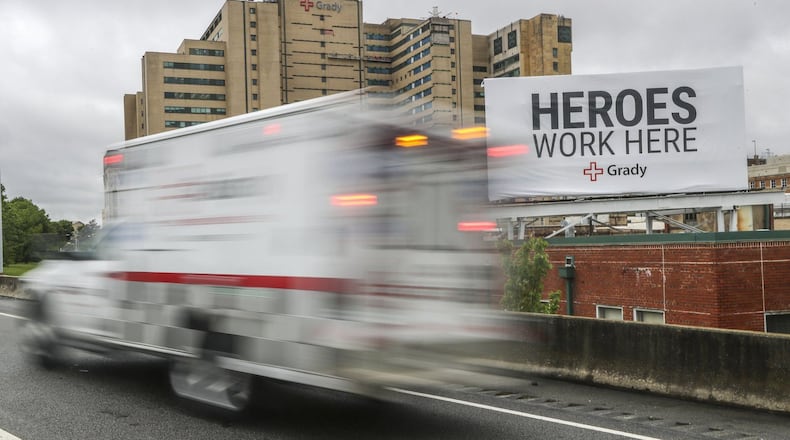An Atlanta mobile bartending service, incorporated in June 2020, requested $165,000 in federal COVID-19 relief funding.
A tourist train line in rural South Georgia asked for $947,000, or it may have to shut down. A group supporting small-town hospitals wants $260 million, another promoting the hotel industry $267 million, and nursing homes $347 million.
Those are just a handful of the nearly 1,500 applications the state received over the past few months requesting $14.6 billion in aid. The projects range from improving water systems and expanding high-speed internet across Georgia to helping individuals and their businesses damaged by the economic fallout since the COVID-19 pandemic began.
State officials are going through the applications — the deadline to make requests was Oct. 31 — and trying to figure out which ones are eligible for help under state and federal guidelines. Committees that will review them and make recommendations to Gov. Brian Kemp will start receiving the applications this week.
Under Georgia law, Kemp will ultimately decide how the state will spend the $4.8 billion in federal COVID-19 relief money that Democrats in Congress approved in March.
The state has received half the money. The applications that came in over the summer and early fall are for part of the pot, about $875 million. So the state received requests asking for more than 16 times what it has to spend this round, according to a review of applications by The Atlanta Journal-Constitution.
Kelly Farr, the governor’s budget director, said many of the applications won’t be considered and some applicants may not have fully investigated federal requirements for the money, or how the state planned to spend it.
“I think people were misinformed,” Farr said. “It was like, ‘Here is this website and it’s giving away free government money.’ ”
Some of the money the state has received from the federal government has already been obligated.
Kemp last month said some will be used to help court systems facing backlogs due to COVID-19 and exacerbated by a rise in violent crime. In September, he announced $1,000 bonuses for police and sheriffs’ employees, EMTs, dispatchers, state troopers and guards, full-time firefighters and others.
Kemp said in the spring that the $875 million portion would be spent in three areas: broadband expansion, water and sewer projects, and help for those hurt financially by the pandemic.
The biggest ask came from the state Department of Labor.
Kemp used $1.5 billion in earlier federal COVID-19 funding last year to shore up the fund that pays unemployment benefits. The COVID-19 shutdown in March and April 2020 tossed millions of people out of work nationally and sent Georgia’s unemployment rates skyrocketing.
Labor Commissioner Mark Butler requested an additional $800 million — which would amount to almost all the money available in this round of spending — to restore and rebuild the state’s unemployment fund.
“If funds are not restored by March 2022, the state’s (fund) is expected to be depleted,” the agency’s request said. “To prevent depletion, the state will need to either use funding provided through these federal funds or burden Georgia businesses with additional taxes in order to pay for state benefits.”
AT&T applied for about $725 million to expand high-speed internet services, according to application records. The state’s economic development agency requested $200 million to promote the tourism industry hard-hit last year by the pandemic.
Charter school groups want $200 million for more facilities. A nonprofit requested $75 million to build a pharmaceutical research and manufacturing plant in Cordele. Grady Memorial Hospital asked for $158 million to increase bed space, while Elbert Memorial Hospital requested $55 million.
The Metro Atlanta Chamber asked for $55 million to underwrite hosting the 2026 soccer World Cup, while the Greater Columbus Sports and Events Council applied for $120 million to upgrade sports facilities.
Individuals, businesses and nonprofits asked for help ranging from less than $10,000 to tens of millions of dollars. Some of the requests came from businesses that only recently incorporated, according to state records. Several asked for money to expand their offerings, build facilities or complete restoration projects, such as $195,000 requested to renovate a golf course clubhouse in Tallapoosa. Some requested money to make up for lost revenue last year or to help those affected by the pandemic.
Many of the nearly 1,500 applications won’t be passed on to the committees that will decide what to recommend to Kemp because they don’t fit the criteria set by the state or federal government.
“Certainly if you tell folks they can apply, they will,” said state Senate Appropriations Chairman Blake Tillery, R-Vidalia, who sits on the committees. “There likely are applications that, while well intended, will not fall under the rules.”
Farr said the money for those who suffered economic loss during the pandemic wasn’t intended to go to business or program expansion projects, and he’s not sure individuals or individual businesses will make the cut either.
“With more than 1,400 applications, we have to figure some things out,” he said. “We don’t really want to pick winners and losers. We wanted to address larger economic impact.”
So, for instance, a large chunk of money could go to programs run by associations to help hospitals or nursing homes or hotels through grants, but maybe not directly to individual hospitals that applied.
And, as Farr noted, the state is just beginning to spend the federal COVID-19 relief money. Georgia has until 2024 to spend it all.
“There is going to continue to be evaluations of what to do with the money,” he said.
Seeking funding
The state received about 1,480 requests for federal COVID-19 relief money in the past few months. They broke down into three categories:
Negative economic impact from the pandemic
$6.6 billion worth of requests
Water and sewer improvements
$4.6 billion worth of projects
High-speed internet
$3.4 billion worth of projects
Source: Office of Planning and Budget
About the Author
Keep Reading
The Latest
Featured




